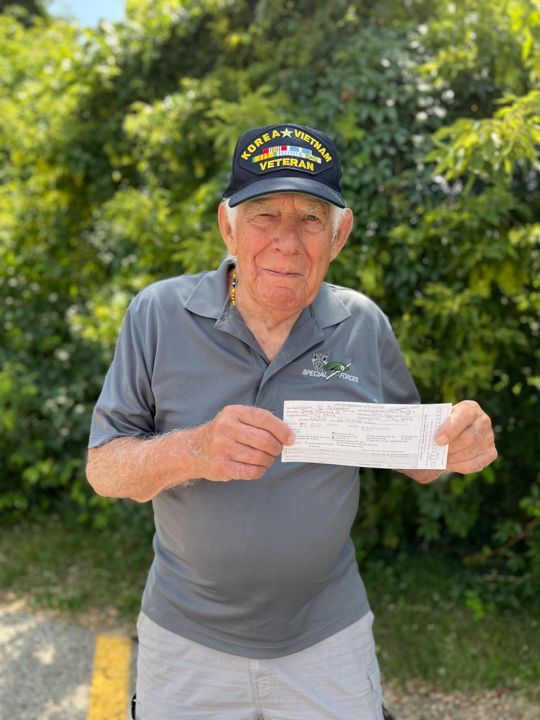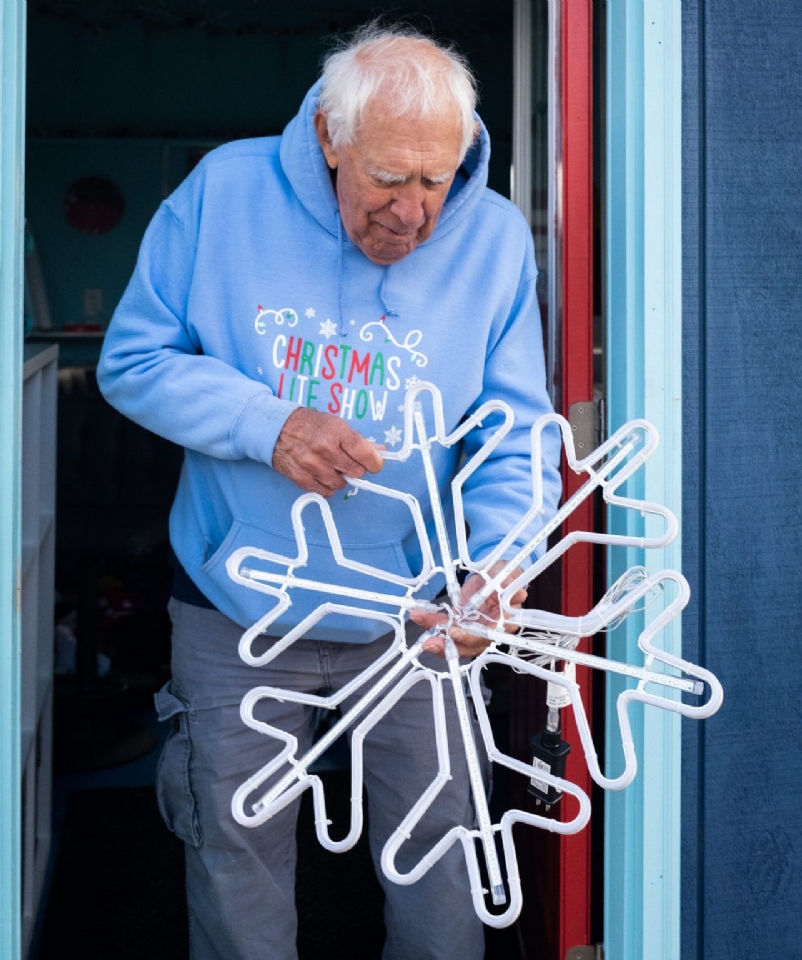GRAND RAPIDS, Mich. – The VFW Department of Michigan awarded Bill Schrader a life Bill, a U.S. Army, Korean War and Vietnam veteran, donated $30,000 to the Michigan Veterans Home at Grand Rapids this year. The home provides quality long-term nursing care for veterans who need assistance with living. The donation was raised from his organization, Christmas Light Show. "It's a home for veterans who don’t have anything,” Schrader said. "They are like minded people and I wanted to support them.” Bill, who received the Silver Star Medal for action in the Korean War, has dedicated his life to serving the American people. This commitment to service started from Schrader’s youth, growing up during World War II in Chelsea, Mich. He remembers watching the patriotism and selflessness of his parents as they supported the war effort from home. "It was very patriotic,” he said. "[When Pearl Harbor was bombed] my dad grabbed his shotgun and went down to the factory to defend it.” In 1948, Schrader left high school to join the U.S. Army as an infantryman. Germany He was stationed in Germany, after completing training. There, Schrader said his WW II leadership put him through intense training, unknowingly preparing him for combat in the Korean War a few years later. The poverty and desperation of the German people living in post-WWII Germany impacted Schrader. He describes a core memory of American GI’s pouring their food from the military chow hall into the tin cans of hungry children waiting outside. "They were crying for help. To see people suffer so much, it pulled at your heart,” Schrader said. "We got to know the people, and we would take everything we could from the mess line to feed them. I’ll never forget that.” "The American people have big hearts,” he continued. "It's instilled in you when you see something like that." Korea Schrader reenlisted in Germany at the age of 21, and volunteered to fight in the developing Korean War. "We were trained to be ready for war, to kill the bad people. I thought I was bulletproof and could do anything,” he said. "Korea was terrible. We lost people all the time.” While in Korea, Schrader said troops were sent out in 45 day cycles because the casualty rate was so high. He recalled how dangerous it was, particularly for troops who came straight from training and were unfamiliar with war tactics. One night, Schrader said a new lieutenant moved his section forward an hour later than the safety window allowed. Despite his warning to stay back, the lieutenant pushed forward. The entire section was killed that night without returning a single shot. "They didn’t have a clue,” Schrader said. "It was the little things that would screw you up. At daylight, us and the Australians [recovered their bodies].” Silver Star - Korea The morning of March 17, 1953, Schrader’s company was overrun by Chinese forces. He crawled into a trench, where he encountered and killed an enemy troop. He remembers being separated from his company, who was pinned down by heavy fire from a Chinese machine gun nest. Schrader crawled toward the nest, but was blown backwards by a grenade, suffering shrapnel to his leg. Despite his injuries, Schrader continued crawling forward. "I knew what I had to do. I knew if I was low enough, the machine gun couldn’t get me,” he said. "If I had my head up a half inch higher, they would have taken my head off.” Schrader recalled looking back to see a fellow soldier trying to push forward with him, but was shot and fell back during the attempt. Wounded, with rounds cracking overhead, and the bodies of fellow soldiers falling around him, Schrader managed to crawl close enough to throw a hand grenade into the nest, killing the enemy inside. "It was very intense, the bullets were cracking, cracking, and cracking, really close,” he continued. "The other guys couldn’t move, there were people getting killed all around them. It was a turkey shoot.” Once the machine gun was neutralized, Schrader and his company pushed forward and arrested the remaining Chinese forces, with some escaping by fleeing. As the battle calmed, Schrader was struck by the youth of their Chinese attackers. "They were all young too.” For his actions, Schrader was awarded the Silver Star Medal, the U.S. military’s third highest award for valor. Schrader credits the tough training from his WWII leadership as the main reason he made it through combat in Korea. "Training had everything to do with it. Adrenaline was running really heavy, and I knew what I had to do.” Schrader’s vivid memories of combat contrasts the cultural nickname dubbing the Korean War as "The Forgotten War.” "God gives you different ways of coping with things,” he said. "I was glad to serve in Korea, and I was glad to be home.” Upon leaving Korea, Schrader stayed in the U.S. Army, and underwent further training. He also got married to his wife Leona (Lee). After a time, he grew restless and desired a career change. Paratroopers came to his leadership school in Ft. Benning, Georgia, and Schrader decided an airborne career was his new direction. He transferred to the 82nd Airborne Division, where he went on to make over 100 jumps in 7 countries. Schrader describes this restlessness and desire to serve as an innate part of the American spirit. "I wanted more action,” he said. "It's in the American genes.” Lebanese Crisis While serving as a paratrooper in the 11th Airborne Division, Schrader was once again stationed in Germany, where he lived with Lee for three years. In 1958, his unit was called to defend the Lebanon border during the nation’s time of political and cultural unrest. Schrader told Lee he should be back in a few days, but ended up deployed for 113 days in total. He said he was grateful that the military took care of his family, and that he lost no soldiers during any firefight they encountered in the country. Once his tour in Germany was complete, Schrader transferred again to U.S. Army Special Forces and joined the green berets, when the unit was authorized in 1961 by President John F. Kennedy. Laos & Vietnam He said leaving his wife Lee and young children Dina and Jason to go to Vietnam was difficult, but Lee's constant encouragement and support in her letters throughout the deployment was instrumental to his morale. "Spouses don’t get enough credit for what they go through when we are away,” he said. "I never got anything negative [in letters] from home, she was very supportive of me. I did not see that with some of the other guys' families. I was grateful.” Schrader recalls a lot of his troops getting injured during the intense warfare in Vietnam. He continued to train local Vietnamese in his role as a green beret for a year, and returned again in 1969. In between these tours, he worked as an advisor for the U.S. National Guard troops in Iran. Michigan National Guard The toll of warfare, mixed with a desire to strengthen his growing family back home led Schrader to leave his special forces unit and accept a position advising the Michigan National Guard. "I was sad to give up the beret, but I knew I had to do it,” he said. "It wasn’t a hard choice to make, because I believe in family first. It was time. It was hard leaving the berets, though.” Schrader said the culture shift between years of active combat and deployments to a National Guard unit in a country unsupportive of the Vietnam war was tumultuous for him and his family. He said his mental health and personal life struggled, but was grateful for Lee’s continuous support through it all. "It was terrible,” he said. "I wasn’t happy, I drank too much and carried a gun for 2 years. I had a really tough time. It's a wonder the wife stuck around with me for that.” However, Schrader said being stateside ultimately gave him the time to seek medical help and rebuild relationships. Lee also made the extra effort to educate herself on some of the mental battles he was dealing with. Schrader said this understanding really helped them heal and move forward. "It was [ultimately] a blessing because it calmed me down,” he continued. "Now I don’t carry a gun at all.” After Service & the Christmas Light Show Schrader retired after 30 years of military service, accumulating 10 total years of foreign deployment. He also received two Purple Heart Medals along with the Silver Star Medal. Now, Schrader has channeled his energy into The Christmas Light Show, an organization he owns and operates that displays an annual light show experience in Grand Rapids. This project started as a conversation with a friend around a fire in 1996. That year, he secured a location to develop this idea, and two years later he hosted his first show. "[The light show] really helped me, I’m really energized,” he said. "I really love what I do. It's all about putting a smile on people’s faces. When you have a passion for something, It's not work. It's all about the kids and bringing joy.” Schrader said the creativity and building projects focused his mind and allowed for family involvement. This year, the show will celebrate 26 years of display, and employs between 25-30 people. Schrader said he tries to hire veterans to loop them into this creative endeavor, and help share the healing he has discovered by this community project.
"There's no question the light show has helped me,” he said. "I talk to God a lot now more than I ever did before. You promise God a lot of stuff when you are under fire. One time I was under artillery fire, two of us in a hole. We promised God if we made it out we would do our best. Over time you forget that, but things like this bring you back to it.” Schrader is supported by Lee and his three children Dina, Jason and Allison. Jason also followed in his father’s footsteps, retiring after 30 years of service in the U.S. Marine Corps and U.S. Army.
Although this project is holiday-centered, Schrader tries to make a point to support his fellow veterans. Every December 7, veterans can attend the show for free in honor of the anniversary of the bombing of Pearl Harbor. He also donates a portion of the proceeds to a veterans cause. His recent donation to the Veterans Home at Grand Rapids was raised from the Christmas Light Show. Schrader’s story is an example of what he says is the commonality of the powerful resiliency of the American spirit. On and off the battlefield, he embodies this spirit which keeps him serving his community today. membership after his many years of community service.
membership after his many years of community service.
Schrader worked on a training team for Laotian villagers during the now declassified Operation White Star 1961-62, prior to the United States’ official involvement in the Vietnam War. He also briefly trained villagers in Iran before being called to serve in Vietnam in 1965.


